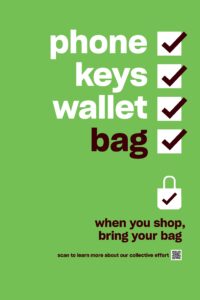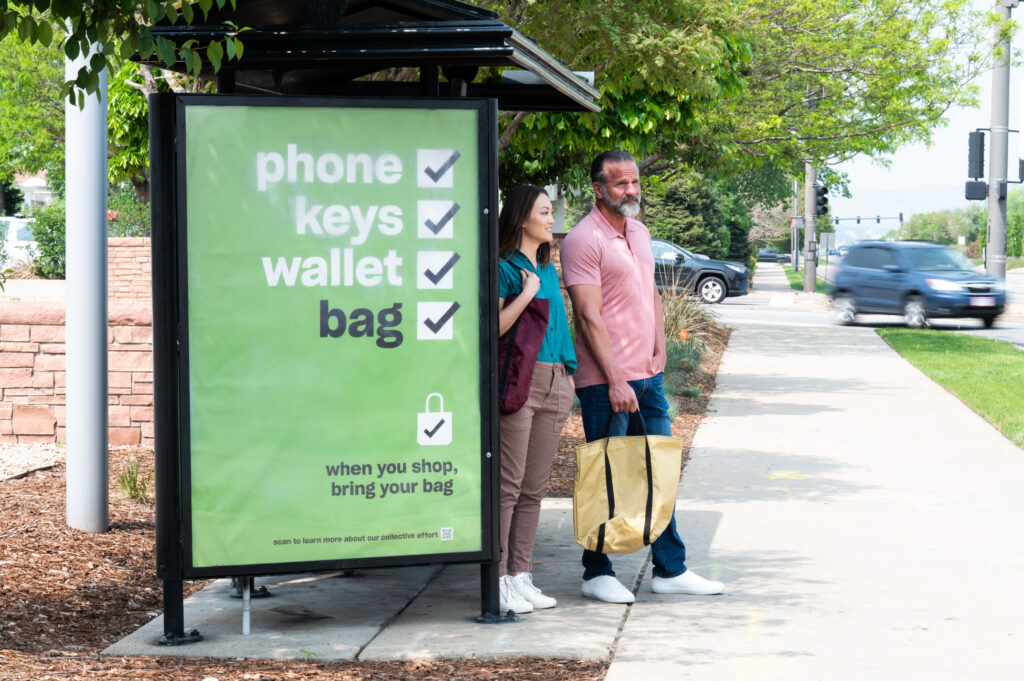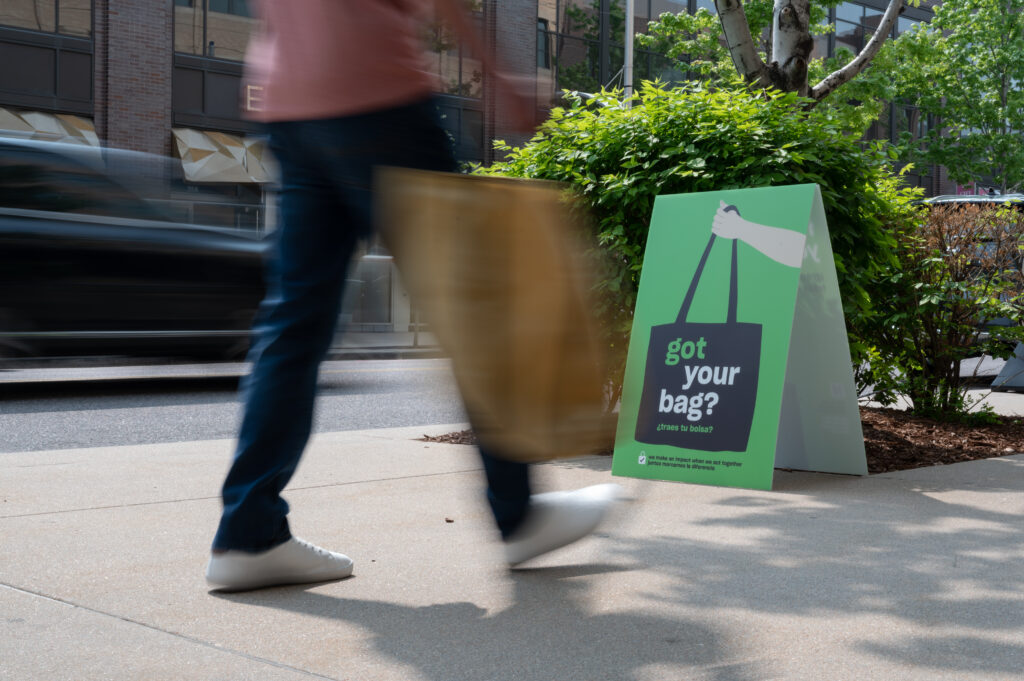May 1, 2023 – National retailers and local mom-and-pop shops across Denver, CO and Tucson, AZ join forces in the new ‘Bring Your Own Bag’ Pilot, a first-of-its-kind initiative launched by the Consortium to Reinvent the Retail Bag, managed by Closed Loop Partners. Many national brands in the U.S., including Consortium partners CVS Health; Target; DICK’S Sporting Goods; Dollar General; The Kroger Co., through local King Soopers & Fry’s stores; TJX, through local T.J. Maxx, Marshalls and HomeGoods stores; and Ulta Beauty, will simultaneously test bag reduction solutions alongside local mom-and-pop shops to determine whether collective retailer action can drive a broader cultural shift, where bringing your own reusable bag becomes the norm wherever customers shop.
While reusable bags are one of the most adopted reusable products today, research from the Consortium to Reinvent the Retail Bag shows a lack of consistency in use. This pilot aims to reinforce the behavior at scale––supporting customers to remember bags more frequently and to reimagine where they could bring said bags, beyond just the grocery store. Participating retailers will test the same bag reduction strategies found in the Consortium’s Playbook––including signage, marketing and customer prompts about reusable bags––in, near and outside over 150 stores in Denver, Tucson and the surrounding metro areas.
This pilot to reduce single-use plastic waste is taking place at a critical time. Today, it is estimated that 100 billion plastic bags are used annually in the U.S. and fewer than 10% are recycled. Resource limits, supply chain disruption and plastic pollution increase the urgency to move from a take-make-waste economic system and “disposable” culture to a more circular economy where materials are shared and reused. Reducing single-use bags across retailers can make a tremendous difference. Even a 1% bag reduction has a significant impact on our waste footprint––it is equivalent to 1 billion fewer bags used and discarded in the U.S. Empowering customers to bring their own bag plays a key role in single-use bag reduction.
The Bring Your Own Bag Pilot will run from May 1 to July 30, 2023 and is informed by the work of the Consortium to Reinvent the Retail Bag over the past three years, including hundreds of innovations evaluated, multiple solutions tested, and thousands of customers and retail staff surveyed. Based on pilot results, the Consortium will explore scaling these low-cost, easy to implement strategies, catalyzing a national cultural shift around reuse.
If you are interested in learning more about the pilot, or if you are a retailer interested in participating, please visit our website here.
“The most sustainable bag is often the one we already own. Retailers coming together to support customers in bringing their own reusable bag whenever and wherever they shop is a key step to reducing single-use plastic waste,” said Kate Daly, Head of the Center for the Circular Economy at Closed Loop Partners. “This pilot brings to life the Beyond the Bag Consortium’s collaborative, holistic approach to addressing an urgent plastic waste challenge, and we look forward to seeing the impact of this effort at scale.”
“As we expand these reusable bag solutions across CVS Pharmacy locations and learn about consumer behaviors, we continue to see the power in collective retail action,” said Sheryl Burke, SVP of Corporate Social Responsibility and Chief Sustainability Officer at CVS Health. “With everyone’s drive, dedication and collaboration, we will continue making a lasting impact on creating a healthier world today and for future generations.”
“We are hopeful these small local steps can lead to greater progress. If we are successful, this multi-city pilot program will provide a model that retailers can scale in other geographies, realizing near-term environmental impact and cost-savings,” said Denine Torr, Dollar General’s vice president of corporate social responsibility and philanthropy.
“We all need to work together to create healthier, thriving communities across the country. This pilot is another opportunity to engage our customers directly as we work to reduce waste,” said Denise Osterhues, Senior Director, Sustainability and Social Impact from The Kroger Co.
“When it comes to finding alternatives to single-use plastic bags, our team is committed to co-creating accessible solutions that bring everyone to the table,” said Amanda Nusz, senior vice president of corporate responsibility at Target. “We’re thrilled to participate in this pilot alongside our consortium partners to explore new ways of encouraging broader reusable bag use by our guests and communities.”
“We are pleased to participate in Closed Loop Partners’ innovative campaign, and to collaborate with so many other retailers in support of the reduction of the waste created by single-use bags. This campaign aligns with our ongoing corporate responsibility and sustainability efforts, and is anchored by our mission to deliver great value to our customers every day while pursuing initiatives that are environmentally responsible and smart for our business,” said Brenna Zimmer, Vice President, Sustainability at TJX.
“As the nation’s largest beauty retailer, we understand our role and responsibility to do what’s right for our guests and our world. The Ulta Beauty teams in these markets are excited to pilot these bag reduction strategies alongside our retail peers. Working together helps lay the foundation for a future where reuse is the norm and together, we can move the industry forward at scale,” said Kristin Wolf, Ulta Beauty’s Senior Vice President of Enterprise Strategy and Transformation.
“We are thrilled to see this innovative campaign running in our city, which will complement Denver’s existing fee on disposable bags. This approach will build awareness and gives customers more opportunities to build the habit of bringing their own bag,” said Grace Rink, Denver’s Chief Climate Officer. “Together we can reduce waste, prevent litter, and protect our rivers and streams.”
“I am grateful to all of the Tucson retailers who are participating in this pilot campaign,” said Tucson Mayor Regina Romero. “Tucsonans and businesses care deeply about our desert environment. Bringing your own reusable bag when shopping reduces the need for single-use plastic bags, helps us advance our goal of reaching Zero Waste by 2050, and keeps our city clean.”
About the Center for the Circular Economy at Closed Loop Partners
The Center for the Circular Economy at Closed Loop Partners unites competitors to tackle complex material challenges and to implement systemic change that advances the circular economy. Adept at navigating every step in the value chain, Closed Loop Partners brings together designers, manufacturers, recovery systems operators, trade organizations, municipalities, policymakers and NGOs to create scalable innovations that target big system problems.
The Center currently manages three consortia: the NextGen Consortium, to advance solutions that can help address single-use foodservice packaging waste; the Consortium to Reinvent the Retail Bag to identify, test and scale solutions that can help address single-use plastic bag waste; and the Composting Consortium, to pilot industry-wide solutions and build a roadmap for investment in technologies and infrastructure that enable the recovery of compostable food packaging and food scraps. Learn more about the Center’s work here.
About the Consortium to Reinvent the Retail Bag
The Beyond the Bag Initiative, launched by the Consortium to Reinvent the Retail Bag, aims to identify, pilot and implement viable design solutions and models that more sustainably serve the purpose of the current retail bag. Closed Loop Partners’ Center for the Circular Economy launched the initiative with Founding Partners CVS Health, Target and Walmart. The Kroger Co. joined as Grocery Sector Lead Partner, DICK’S Sporting Goods joined as Sports & Outdoors Sector Lead Partner, Dollar General as Value Sector Lead Partner, TJX as Apparel & Home Goods Sector Lead Partner, and Ulta Beauty as Beauty Sector Lead Partner. Ahold Delhaize USA companies, Albertsons Companies, H-E-B, Hy-Vee, Meijer, Wakefern Food Corp., and Walgreens are Supporting Partners, and Conservation International and Ocean Conservancy serve as Environmental Advisory Partners. Learn more about the Consortium here.
Contact: [email protected]



